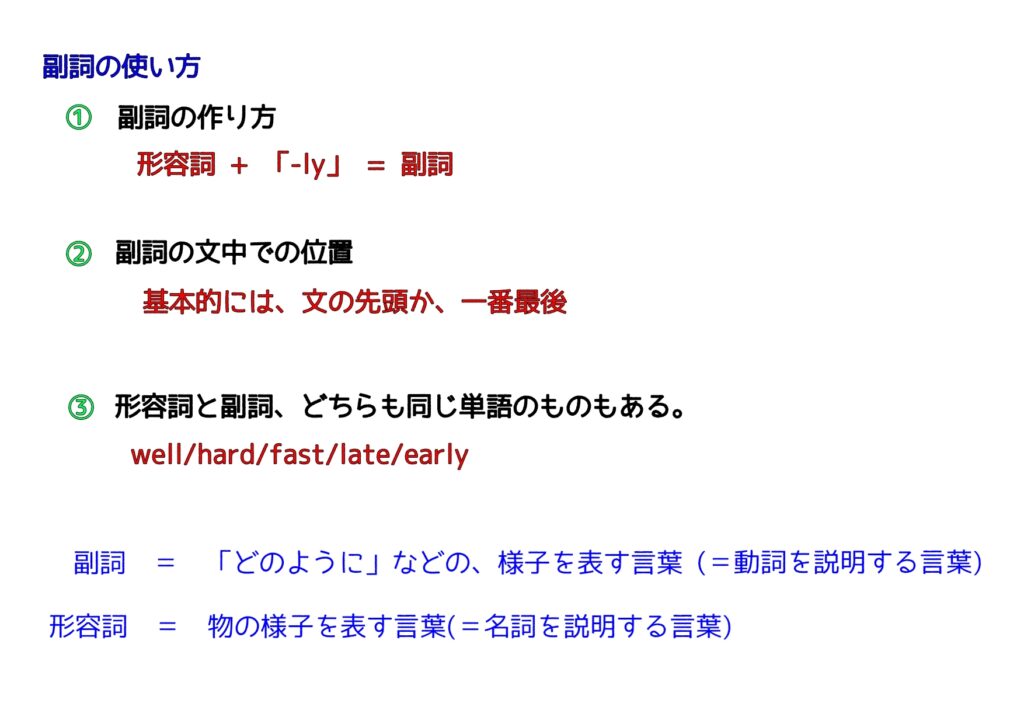第71回:形容詞と副詞を使い分ける。

形容詞を副詞に変えると、意味が変わるものがあります。
Q. この記事で、一番大事なことって何?
A. 大事なことを、1枚の画像にまとめました。

いちいちノートにまとめるのが面倒だという方、また、
ノートにまとめることが苦手だという方は、ご活用ください。

[広告]
確かな英語力は、日々の継続から。
その継続を後押しする、第二言語習得理論に基づいた
オンライン英語学習プログラムがあります。
英語を使う人のための、確実なスキルアップが望める
7日間の無料体験はこちらから!

副詞の作り方と使い方
今回は、形容詞と副詞について解説します。副詞は形容詞に「-ly」を付けることで形成されることが一般的ですが、いくつかの例外もあります。以下、詳しく説明します。
- 形容詞 + -lyで形成される副詞
方法や状態を表す副詞は、形容詞に「-ly」を付けることで形成されます。例えば、「sudden」(突然の)からは「suddenly」(突然に)、また「happy」(幸せな)からは「happily」(幸せに)となります。
ただし、既に「-ly」で終わる形容詞(例: cowardly, elderly, friendly, kindly, lively, lonely, lovely)は、「-ly」を追加せずに副詞として使用することができます。代わりに、「fashion」(方法)、 「manner」(やり方)、または「way」(方法)を前置詞句と組み合わせて表現することもできます。
例えば、「He smiled at me in a friendly way.」(彼は友好的な方法で私に微笑みました。)、「She waved her hands around in a lively fashion.」(彼女は活発なやり方で手を振り回しました。)といった表現が該当します。
また、過去分詞で終わる形容詞の多くは副詞形が存在せず、代わりに前置詞句を使用します。「They rose to greet me in a subdued manner.」(彼らは控えめな態度で私に挨拶した。)のように、「subduedly」ではなく「in a subdued manner」と表現します。ただし、一部の過去分詞形容詞には「-ly」で形成される副詞形が存在します。
- 二つの形式を持つ副詞
一部の副詞は「-ly」で終わる形式とそうでない形式の2つを持っています。意味に変化はない場合もありますが、形式的には「-ly」で終わる形式が文法的に正しく、より形式的な文体に使用されます。ただし、副詞が動詞の直前に来る場合は必ず「-ly」で終わる形式を使用する必要があります。
例えば、「She ran quick/quickly towards the door.」(彼女は速くドアに向かって走った。)という文では、「quickly」の方がより正確です。「She quickly ran towards the door.」(彼女は素早くドアに向かって走った。)のように表現します。
また、一部の副詞は「-ly」の有無で意味が異なる場合があります。例えば、「She gave her time free.」(彼女は無料で時間を提供した。)と「She gave her time freely.」(彼女は自由に時間を提供した。)は意味が異なります。「I arrived late for the concert.」(コンサートに遅れて到着した。)と「I haven’t seen Amy lately.」(最近エイミーに会っていない。)も意味が異なります。
- 特定の形容詞とその副詞形
一部の形容詞には特定の副詞形が存在します。
- 「deeply」は「deep」の副詞形で、非常に強い感情を表します。「He felt deeply hurt by her criticisms.」(彼は彼女の批判に深く傷ついた。)、「They loved each other deeply.」(彼らは深く愛し合った。)といった使い方があります。
- 「directly」は「direct」の副詞形で、「straight」や「immediately」という意味で使用されます。「The door was wide open so I just went straight in.」(ドアは広く開いていたので、私はそのまま中に入った。)、「He saw Hassan directly ahead.」(彼はハッサンを真正面に見た。)といった表現があります。
- 「highly」は「high」の副詞形で、「非常に」や「大いに」という意味で使用されます。「Everyone thinks highly of her teaching.」(皆が彼女の教え方を高く評価しています。)といった使い方があります。
以上が、形容詞と副詞の形成と使用についての解説でした。正確な表現を使い分けながら、文章をより効果的に表現しましょう。
具体例
- Adverbs formed from adjectives ending in -ly:
- Adjective: motherly
Adverb: She hugged the child motherly. - Adjective: elderly
Adverb: He walked slowly and elderly down the street.
- Adverbs with two forms:
- Adverb: loud
Adverb (with -ly): The music played loudly in the concert hall. - Adverb: quick
Adverb (with -ly): She quickly finished her homework.
- Adverbs with different meanings with and without -ly:
- Adverb: free
Adverb (with -ly): He gave his time freely to help those in need. - Adverb: late
Adverb (with -ly): She arrived fashionably late to the party.
- Additional examples:
- Adverb: clear
Adverb (with -ly): He spoke clearly so that everyone could understand. - Adverb: high
Adverb (with -ly): She jumped high to catch the ball. - Adverb: awful
Adverb (with -ly): The singer performed awfully, hitting all the wrong notes. - Adverb: deep
Adverb (with -ly): They delved deeply into the mystery to uncover the truth. - Adverb: direct
Adverb (with -ly): He addressed the issue directly, without any hesitation. - Adverb: mostly
Adverb (with -ly): They mostly agreed with the proposal, but had a few concerns. - Adverb: short
Adverb (with -ly): They ended the meeting shortly after resolving the main issue. - Adverb: widely
Adverb (with -ly): The news of their engagement spread widely throughout the town.
Please note that some of these examples are created for illustrative purposes and may not be commonly used in the exact form presented.
[広告]
TOEICのスコアを上げたいけれど、
まとまった勉強時間が取れなくて困っている…
なら、細かいスキマの時間を使いながら、
少しずつスキルを積み重ねてみてはどうでしょう。
スマホ1つでスコアアップが出来る、
オンライン講座のリンクはこちらから。

Q. この文法はどうやって使うのでしょうか?
A. 今回の文法を活用した会話文を見てみましょう。

How did John give his presentation at the conference?
(ジョンの会議でのプレゼンテーション、どうだった?)

He spoke confidently and presented his ideas clearly.
(自信を持って、アイデアを明確にプレゼンしたよ。)

That’s great to hear. I’ve always admired his ability to communicate effectively.
(それは素晴らしいね。彼の効果的なコミュニケーション能力にはいつも感服しているよ。)

Yes, he’s a naturally eloquent speaker. He effortlessly engages the audience with his well-thought-out arguments.
(そうだね。彼は天性の雄弁家で、緻密に考え抜かれた議論で観客を引き込むんだ。)

I agree. He’s truly talented. He always manages to convey his message convincingly.
(同感だよ。彼は本当に才能がある。いつも説得力を持ってメッセージを伝えるんだ。)

Definitely. He has a friendly manner that makes people feel at ease, even when discussing complex topics.
(確かに。彼はフレンドリーな態度で人々を安心させるんだ。複雑なトピックを話すときでもそうだよね。)
[広告]
ロゼッタストーン・ラーニングセンターで、最先端の教育制度を活用して英語を学びませんか?私たちは個々の学習ペースに合わせてeラーニングと対面教育を組み合わせ、柔軟な学習環境を提供しています。自宅でのeラーニングと対面教育のメリットを最大限に活かし、あなたの英語学習をサポートします。最新のテクノロジーと個別の指導が組み合わさった当センターで、自由な学習スタイルを体験してみませんか?英語学習を楽しく効果的に進めるための環境がここにあります。新たな一歩を踏み出して、新しい英語学習の旅に参加しましょう!

Q. この記事の要点は?
A. 形容詞と副詞の関係・副詞の使い方を確認しました。
Adjectives and adverbs:
- Adverbs of manner:
- Formed by adding -ly to adjectives
: sudden → suddenly, happy → happily. - Adjectives ending in -ly use prepositional phrases with fashion, manner, or way instead of adding -ly.
- Participle adjectives ending in -ed often use prepositional phrases or preposition + noun.
- Some participle adjectives have an adverb form with -ly.
- Adverbs with two forms:
- Some adverbs have both an -ly and non-ly form.
- Either form can be used, but the -ly form is more formal and grammatically correct.
- The -ly form is necessary when the adverb precedes the verb.
- Adverbs with different meanings:
- Some adverbs have different meanings with and without -ly.
- Examples include: free/freely, late/lately, deep/deeply, direct/directly, high/highly, just/justly, most/mostly, short/shortly, wide/widely.
英会話を始めてみたいけれど、どのサービスが良いか分からない…
そんな方は、まず、この記事で3つのサービスを比べてみてはいかがでしょうか?
英語力を効率良く伸ばすことができるサービス3選です。

次回の文法解説は?
比較級・最上級と形容詞・副詞
この記事を作る際に参考にした文法の解説書になります。
すべて英語で書かれていますが、練習問題が付いてます。
イギリス英語なので、スペル等の表記が異なる部分もありますが、
「使い方を練習したい」「繰り返し問題を解きたい」
という方は、使ってみても良いかもしれません。

関連記事一覧
他の文法解説記事を検索できます。







-320x180.jpg)




コメント